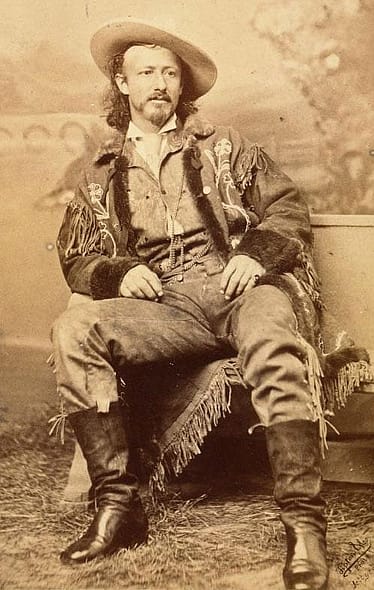Texas Jack

“Texas Jack” Omohundro
1846 – 1880
By Thadd Turner
Texas Jack was an old friend of mine…I learned to know him and respect his bravery and ability…he was a whole souled, brave, and good hearted man. —William F. “Buffalo Bill” Cody, Leadville, Colorado, September 5, 1908
Few men can ever hope to achieve lasting immortality such as the likes of Buffalo Bill Cody and Wild Bill Hickok. One man earned their friendship, trust, and the recognition by others for his fearless contribution to the safety and welfare of the soldiers and civilians of the rugged frontier. John Burwell “Texas Jack” Omohundro lived a life as exciting and dynamic as the other two famous scouts’ adventurous journey into history.
The fourth child of John Burwell and Catherine S. Baker Omohundro, Texas Jack was born July 27, 1846 at Palmyra, Fluvanna County, Virginia. At the young age of 17, he enlisted in Robert E. Lee’s Army of Northern Virginia, serving under Major General J.E.B. Stuart’s 5th Cavalry Corps. After the war, John went to Texas and spent the next three years becoming an experienced cowboy. It was in 1866 that he acquired his sobriquet of “Texas Jack” on a cattle drive to Tennessee. The name stuck for the remainder of his life.
By the summer of 1869, Omohundro was at Fort Hays, Kansas, where he met “California Joe” Milner, whom introduced the young cowboy to Wild Bill Hickok, then the acting sheriff of Ellis County. Later in the year, Jack would first meet Buffalo Bill Cody who was scouting for the 5th U.S. Cavalry at Fort McPherson, Nebraska. Cody was instrumental in getting Jack hired on as a “trail agent and scout” for the 5th. They would become the best of friends for many years thereafter.
Texas Jack was at home on the open plains, and began to become a favorite scout among the various cavalry commanders due to his outstanding tracking and guiding abilities, and his deadly marksmanship with both rifle and pistol. The Virginian was fast becoming known as one of the best trail agents, Indian fighters, and hunting guides on the frontier.
1872 was a remarkable year for Omohundro and Cody. In April, he and Buffalo Bill were the lead scouts during a small engagement against hostiles that eventually led to Cody receiving the Congressional Medal of Honor. Texas Jack served along side Buffalo Bill as a hunting guide to the Grand Duke Alexis of Russia’s hunting party under Lt. Colonel Custer. Later that summer, he was selected by Major Frank North to escort the Pawnee off their reservation for a huge buffalo hunt. He would thereafter be known as “whirling rope” by these warriors of the Plains. Texas Jack described the buffalo hunt for the Spirit of The Times newspaper in March of 1877: “Talk of tornadoes, whirlwinds, avalanches, waterspouts, and prairie fires… boil them all together, mix well, and serve on one plate… and you might have a limited idea of the charge of this ‘light brigade’…”
In December, Cody and Omohundro appeared together in the stage show, “Scouts of The Prairie,” which featured the well known frontier scouts as live actors. By late 1873, Wild Bill would join the two showmen as one of the new primary leads in the renamed production “Scouts of The Plains” during the show’s second season. Through out the remainder of the late 1870s, Texas Jack would continue to perform in the theater. He became a newspaper correspondent for the Times and the New York Herald, and wrote accounts of his exciting days as a young “cowboy,” one of which was used by Buffalo Bill in the brochures of his great outdoor Wild West show during the late 1880s.
Sadly, Texas Jack never obtained the lasting immortality that his good friends would achieve. Just one month short of his 34th birthday, Omohundro unexpectedly contracted pneumonia and died on June 28, 1880 in Leadville, Colorado. He was accompanying his wife, the beautiful actress and ballerina, Josephine Morlacchi, on a stage show tour. He was buried in the local Evergreen Cemetery. Buffalo Bill paid tribute to his old friend in September of 1908, when he commissioned a new headstone be erected on Jack’s gravesite.
Texas Jack remained a popular figure with the American public for many years after his death, in part due to the many dime novels that were published about his exploits, including such titles from the Beadles Pocket Library as “Texas Jack, The Mustang King,” and “Texas Jack, The Lasso King,” both published in 1891. In 1994, over 114 years after his tragic death, John Burwell “Texas Jack” Omohundro was posthumously elected to the National Cowboy Hall of Fame in Oklahoma City, Oklahoma, where he received the Wrangler Award in the Hall of Great Western Performers for his skills as an original working cowboy and stage actor.
